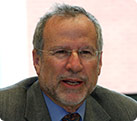Schauer Charges Students to Ponder Nature of Legal Reasoning
Professor Frederick Schauer asked students to consider what it is to “think like a lawyer” at a Student Scholarly Lunch on Wednesday.
 Schauer, whose book, “Thinking Like a Lawyer: A New Introduction to Legal Reasoning” will be available in April, was named one of the most influential people in legal education by National Jurist magazine last month.
Schauer, whose book, “Thinking Like a Lawyer: A New Introduction to Legal Reasoning” will be available in April, was named one of the most influential people in legal education by National Jurist magazine last month.
Law students, Schauer said, are told from the beginning of their education that they are not in law school to learn legal rules or practical skills, but to learn to “think like a lawyer.”
However, there are many scholars who believe there is no such thing as legal reasoning, he said.
“There are a fair number of quite-distinguished skeptics about whether there is anything at all that can be called ‘thinking like a lawyer.’ Whether there is anything at all that is characteristically legal reasoning, as opposed to good thinking, good reasoning or anything of that variety,” Schauer said.
Schauer said one school of skeptics, the pragmatists, believe that legal reasoning should involve taking all factors into consideration and making “the right decision for just this case on just this occasion,” he said.
Others contend that what is often called legal reasoning is simply good, moral reasoning, which is not specifically legal at all.
“They would say, ‘Yes we want our judges and our other legal reasoners to exercise the best of practical reasoning, we want our judges and legal reasoners to be pragmatic, but we also want this in our physicians, our policymakers, our scientists and everything else,’” Schauer said. “Lawyers are particularly good at it, are trained to be good at it, but it is nothing that is in any way specially, characteristically or distinctively legal.”
Finally, legal realists view judges and other legal decision-makers as human beings who exhibit the typical range of virtues and faults. This means that to understand legal reasoning, one must study human nature and the way all people make decisions.
Schauer said his own philosophy is that there is legal reasoning, but it is not entirely specific to the field of law. The concept of precedence, he said, is often used by children: “Why can’t I go to a rock concert at the age of 14 if you let my older sister go to a rock concert when she was 14?”
The concept of authority, he said, is displayed by the Catholic Church’s view of the Pope.
“If there is something that is special about legal reasoning, it is important to recognize that it is not totally, entirely hermetically sealed ‘special.’ The differences between legal reasoning and ordinary reasoning are not the differences between literary criticism and differential calculus, or the differences between Estonian and English or other things in which there is almost no overlap,” Schauer said.
“Most of the things that we do and think about when we do legal reasoning are things that we think about in ordinary life … All of this is to suggest that rules, precedent, authority, sources and a whole bunch of things exist in lots of places outside the law.”
However, Schauer said he believes certain types of reasoning are particularly suited, though not exclusive, to legal argument and reasoning.
“In numerous other ways, arguments from precedent, rules, authority, so on, are in my view concentrated in the legal system. In ways that they are present, but not as present in other areas. We always talk about authority; scientists almost never do. In science, one is expected to do one’s own research, reach one’s conclusion, and the idea that something is right in science just because someone else has said so seems somewhat bizarre to most scientists. So, too in lots of other areas,” Schauer said.
A concept that is unique to the legal system, Schauer said, is that some decisions are based not on what is the best result in a particular case, but on what is the right systemic result. Rules and precedent matter, he said, even if they do not create the “right” results in every case.
“To take legal texts seriously, to take the ‘writtenness’ of law seriously, legal rules seriously, legal precedent seriously, is to do something other than reach the right result in every case and therefore with some frequency, to be willing to accept for larger systemic reasons, reaching the wrong result in a particular case,” Schauer said.
Founded in 1819, the University of Virginia School of Law is the second-oldest continuously operating law school in the nation. Consistently ranked among the top law schools, Virginia is a world-renowned training ground for distinguished lawyers and public servants, instilling in them a commitment to leadership, integrity and community service.


